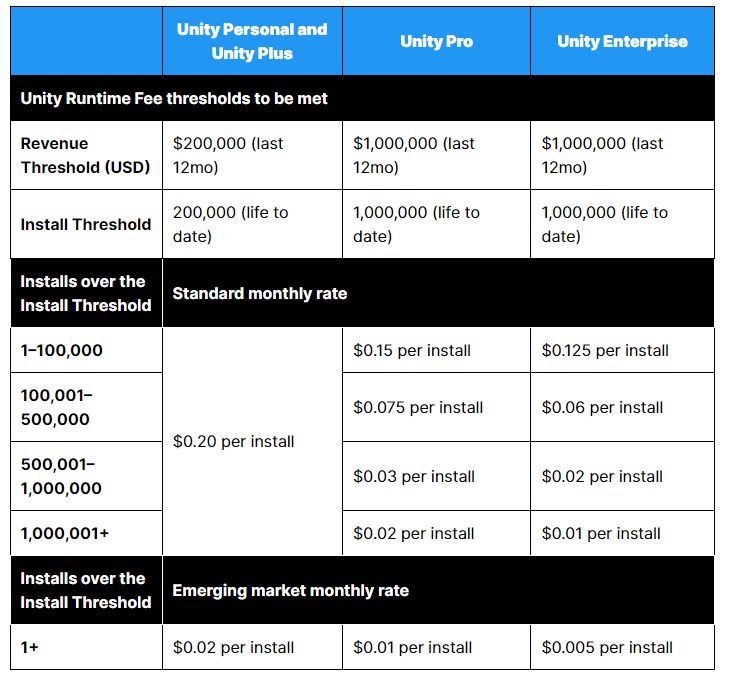Unity plans to introduce a new ‘Runtime Fee’ next year and charging developers based on how many installs they reach.
Effective from January 1, 2024, Unity confirms any games running the Unity Engine – comprised of Unity Editor and Unity Runtime – will incur this new charge based on revenue in the last 12 months and lifetime installs. Studios on Personal or Plus plans must hit $200,000 revenue and 200k installs, with subsequent installs costing $0.20 each.
Pro or Enterprise plans have considerably higher thresholds, starting at $1 million revenue and 1 million installs. For Pro users, install charges ranges from $0.15 – $0.02 depending on how far over the threshold the game is, while Enterprise users go from $0.125 – $0.01. Here’s the full table:

Detailed in an FAQ, Unity confirmed the fee applies to currently available games that distribute the Unity Runtime, though developers will not be retroactively charged for installs. The standard rate will apply to installs across 18 countries, including the United States, Australia, UK and Japan. However, emerging gaming markets like India will receive a discounted rate.
Unity states that “qualifying customers” may be eligible for credits towards the Runtime Fee, based on adopting other Unity services. Editor excluded, that includes using Unity Gaming Services or Unity LevelPlay, a mediation service for mobile ad-supported games. Film, gambling, or education subscription plans are unaffected.
Developer Response
The announcement of the Runtime Fee has been received negavtively by a large number of developers who have work they’ve made in Unity. Some expressed interest in alternative game engines like Godot or Unreal, while others questioned the wider implications for current releases. Initial criticism was fairly unanimous.
In VR game development specifically it’s believed the majority of studios use Unity Engine. Numerous VR developers like Anton Hand (Hot Dogs, Horseshoes & Hand Grenades), Zach Tsiakalis-Brown (Vertigo 2), Dirk Van Welden (Space Pirate Trainer) and Ryan Engle (GOLF+) have also criticized the decision.
Responding to UploadVR’s request for comments, Liam Cary (Arcade Legend VR) believes Unity will retract this change due to the backlash. He believes “some developers might actually benefit by reducing license costs” but states this could harm free-to-play games like Roblox and VRChat, also killing marketing features like Steam Next Fest demos or soft launches on SideQuest/App Lab.
We’ll keep an eye out for updates or details on the policy as developers continue to respond to new Unity fee.
This article was originally published on uploadvr.com